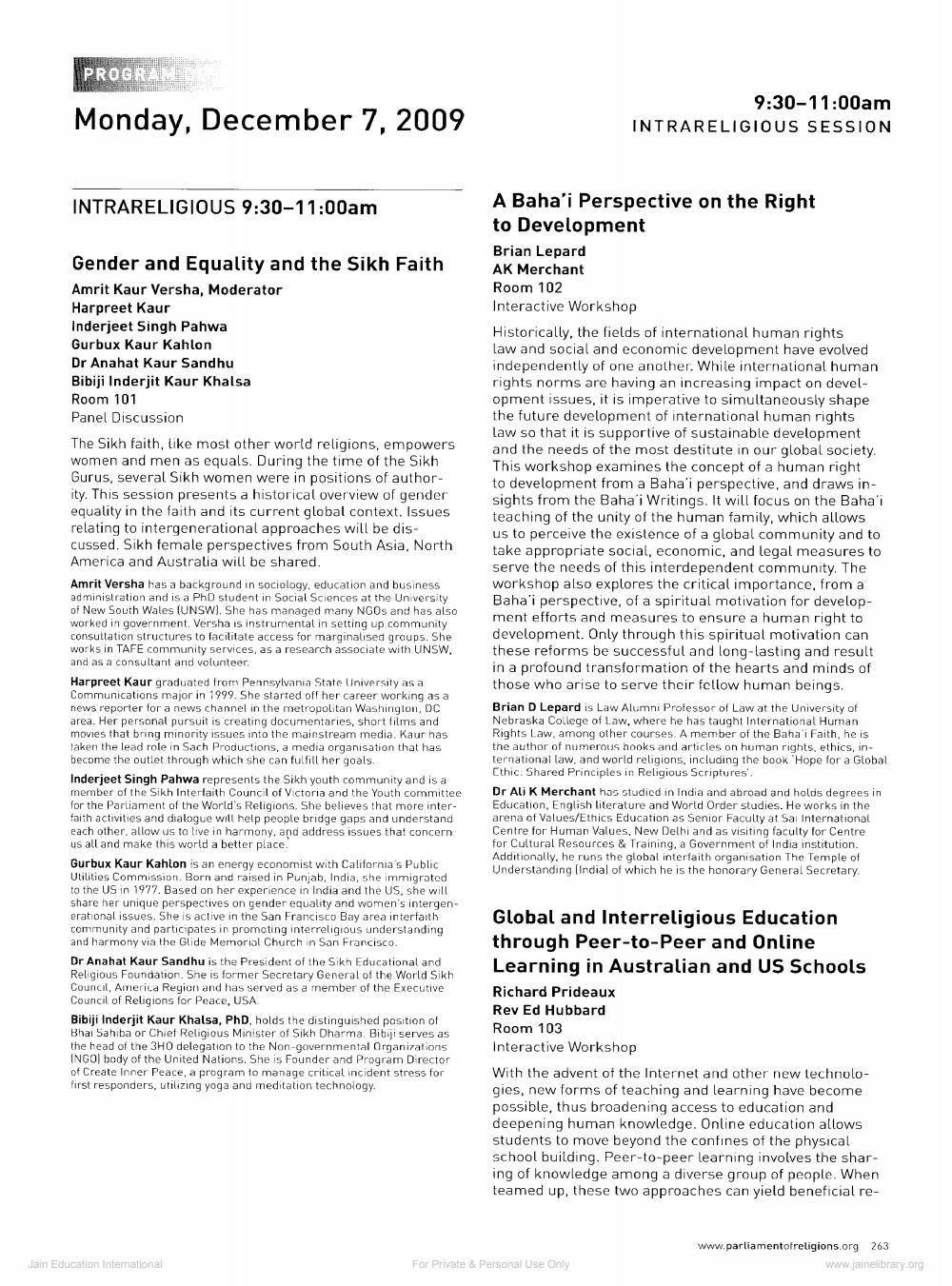________________
PROGR
Monday, December 7, 2009
9:30-11:00am INTRARELIGIOUS SESSION
INTRARELIGIOUS 9:30-11:00am
Gender and Equality and the Sikh Faith Amrit Kaur Versha, Moderator Harpreet Kaur Inderjeet Singh Pahwa Gurbux Kaur Kahlon Dr Anahat Kaur Sandhu Bibiji Inderjit Kaur Khalsa Room 101 Panel Discussion The Sikh faith, like most other world religions, empowers women and men as equals. During the time of the Sikh Gurus, several Sikh women were in positions of authority. This session presents a historical overview of gender equality in the faith and its current global context. Issues relating to intergenerational approaches will be discussed. Sikh female perspectives from South Asia, North America and Australia will be shared. Amrit Versha has a background in sociology, education and business administration and is a PhD student in Social Sciences at the University of New South Wales (UNSW). She has managed many NGOs and has also worked in government. Versha is instrumental in setting up community consultation structures to facilitate access for marginalised groups. She works in TAFE community services, as a research associate with UNSW. and as a consultant and volunteer Harpreet Kaur graduated from Pennsylvania State University as a Communications major in 1999. She started off her career working as a news reporter for a news channel in the metropolitan Washinglon, DC area. Her personal pursuit is creating documentaries, short films and movies that bring minority issues into the mainstream media. Kaur has taken the lead role in Sach Productions, a media organisation that has become the outlet through which she can fulfill her goals Inderjeet Singh Pahwa represents the Sikh youth community and is a member of the Sikh Interfaith Council of Victoria and the Youth committee for the Parliament of the World's Religions. She believes that more interfaith activities and dialogue will help people bridge gaps and understand each other, allow us to live in harmony. and address issues that concern us all and make this world a better place. Gurbux Kaur Kahlon is an energy economist with California's Public Utilities Commission. Born and raised in Punjab, India, she immigrated to the US in 1977. Based on her experience in India and the US, she will share her unique perspectives on gender equality and women's intergen erational issues. She is active in the San Francisco Bay area interfaith community and participates in promoting interreligious understanding and harmony via the Glide Memorial Church in San Francisco. Dr Anahat Kaur Sandhu is the President of the Sikh Educational and Religious Foundation. She is former Secretary General of the World Sikh Council, America Region and has served as a member of the Executive Council of Religions for Peace, USA. Bibiji Inderjit Kaur Khalsa, PhD. holds the distinguished position of Bhai Sahiba or Chief Religious Minister of Sikh Dharma Bibiji serves as the head of the 3HO delegation to the Non-governmental Organizations INGO) body of the United Nations. She is Founder and Program Director of Create Inner Peace, a program to manage critical incident stress for first responders, utilizing yoga and meditation technology.
A Baha'i Perspective on the Right to Development Brian Lepard AK Merchant Room 102 Interactive Workshop Historically, the fields of international human rights law and social and economic development have evolved independently of one another. While international human rights norms are having an increasing impact on development issues, it is imperative to simultaneously shape the future development of international human rights law so that it is supportive of sustainable development and the needs of the most destitute in our global society. This workshop examines the concept of a human right to development from a Baha'i perspective, and draws insights from the Baha i Writings. It will focus on the Baha'i teaching of the unity of the human family, which allows us to perceive the existence of a global community and to take appropriate social, economic, and legal measures to serve the needs of this interdependent community. The workshop also explores the critical importance, from a Baha'i perspective, of a spiritual motivation for development efforts and measures to ensure a human right to development. Only through this spiritual motivation can these reforms be successful and long-lasting and result in a profound transformation of the hearts and minds of those who arise to serve their fellow human beings. Brian D Lepard is Law Alumni Professor of Law at the University of Nebraska College of Law, where he has taught International Human Rights Law, among other courses. A member of the Baha'i Faith, he is the author of numerous hooks and articles on human rights, ethics, international law, and world religions, including the book "Hope for a Global Cthic. Shared Principles in Religious Scriptures. Dr Ali K Merchant has studied in India and abroad and holds degrees in Education, English literature and World Order studies. He works in the arena of Values/Ethics Education as Senior Faculty at Sai International Centre for Human Values, New Delhi and as visiting faculty for Centre for Cultural Resources & Training, a Government of India institution. Additionally, he runs the global interfaith organisation The Temple of Understanding (Indial of which he is the honorary General Secretary
Global and Interreligious Education through Peer-to-peer and Online Learning in Australian and US Schools Richard Prideaux Rev Ed Hubbard Room 103 Interactive Workshop With the advent of the Internet and other new technologies, new forms of teaching and learning have become possible, thus broadening access to education and deepening human knowledge. Online education allows students to move beyond the confines of the physical school building. Peer-to-peer learning involves the sharing of knowledge among a diverse group of people. When teamed up, these two approaches can yield beneficial re
www.parliamentofreligions.org 263
www.jainelibrary.org
Jain Education International
For Private & Personal use only




